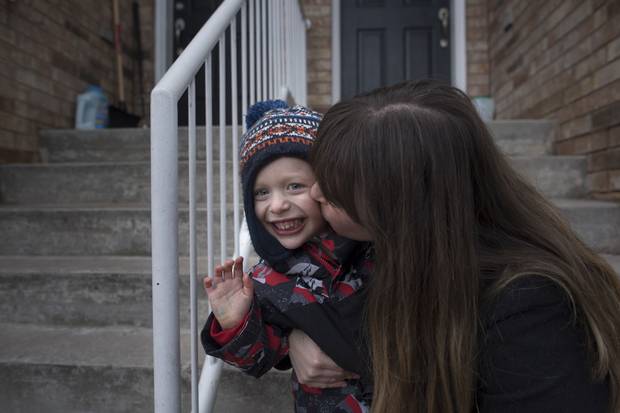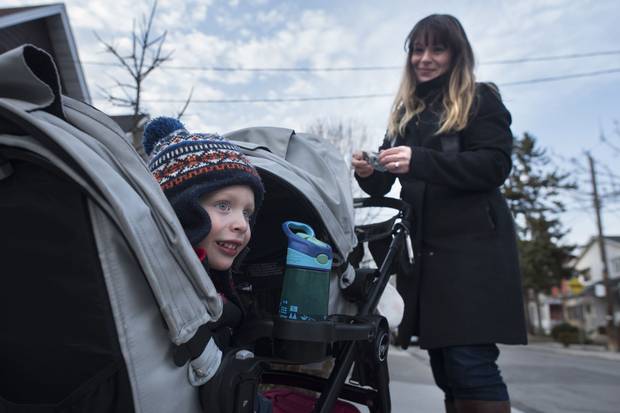Benjamin Kleiman, born in late November, will be only three years old when he starts kindergarten next fall. His mother worries how he'll fare in a mixed class of four– and five-year-olds. If she wants to, she could hold him back another year – part of a new message the head of Canada's largest board is telling principals.
"He will be the youngest and while socially he's used to other kids and sharing, he's not emotionally mature enough to stand up for himself yet, or self-regulate if things get frustrating," said Amy Lazar Kleiman, who lives in Toronto.
Newly released data from the Toronto District School Board supports her concerns. A fifth of young children who have late birthdays are lacking in the emotional and physical maturity they need to succeed in senior kindergarten, according to figures released by the TDSB last month. The report builds on existing research that shows age differences of just a few months can have significant implications in early grades. However, there is debate on the merits of holding children back.
Kindergarten students born between October and December are more likely to have the lowest scores on a range of developmental assessments measuring language, social competence, physical health and emotional skills, TDSB figures show. Students born earlier in the year do much better.
The data comes as families are registering for kindergarten, raising questions on whether holding some children back will give them an advantage. The public board's education director is reminding principals to tell parents that children born in October, November and December have a choice as to when their children start school.
Kindergarten is voluntary, but children must attend Grade 1 when they are six, unless special arrangements are made with their school. Typically in Ontario, children with late birthdays attend school with their peers born in the same calendar year. However, many parents are unaware that province's Education Act states that children who turn six after the first day of school can wait another year.
John Malloy, head of the TDSB, said he is reminding principals to inform parents who have children with late birthdays that they have options, especially if they are nervous. "From a Toronto perspective, we're looking at our data and we understand that there may be vulnerabilities [among children with late birthdays]," Mr. Malloy said.
Holding children back another year can be agonizing for parents, and has financial implications as families are forced to look for alternative care. In Toronto, an extra year of daycare could cost about $1,100 a month. Late-birthday children in Ontario are as young as three when they start full-day kindergarten, and may not be fully toilet trained or have the capacity to communicate clearly.
Ms. Lazar Kleiman said she and her partner discussed holding Benjamin back a year. She even tried an alternative school where the class sizes are smaller, but she lost in the lottery. In the end, they decided to register their son for kindergarten this coming fall. Benjamin is outgoing and should thrive, but Ms. Lazar Kleiman is concerned that he could get lost in a large class of up to 30 students. "I think there's a lot of growing and thriving that will happen in junior kindergarten. But I'm worried about the growing pains," she said.

Ms. Lazar Kleiman said she and her partner discussed holding Benjamin back a year, but they ultimately decided to register their son for kindergarten for the fall.
FRED LUM/THE GLOBE AND MAIL
The TDSB data shows the achievement gap among children with late birthdays is still evident in Grade 3 standardized test scores, and there is some gap in the Grade 6 scores. But it narrows over time and almost disappears by high school. Ontario's full-day kindergarten program, a play-based curriculum, is designed to meet the developmental needs of all children.
Holding children with late birthdays back an extra year is known as redshirting, a term that originated in U.S. college sports where athletes are kept out of competitive games for a year to further develop their skills.
Studies are mixed on the practise of postponing entrance into school. Some academics say that it gives children with late birthdays time to develop physically, intellectually and socially.
But Janette Pelletier, a child development expert at the Ontario Institute for Studies in Education at the University of Toronto, argued that holding children back is not good advice for parents. Research shows that younger children show more rapid growth over time than older children, she said. "In some cases, the gap is completely reduced by Grade 2, and in other research, the gap is still there but much lessened. Studies show that the gap is completely gone by the end of the elementary school years," Prof. Pelletier said.
John McNamara, a professor in the department of child and youth studies at Brock University, held one of his own sons back a year. His son was born on Dec. 23, and Prof. McNamara delayed his entry into school till the following year because he did not believe his child was ready.
His other child was born in November, but in that case, Prof. McNamara enrolled him in school with peers born in the same calendar year.
"I think parents need to make an individual decision about their kid based on their emotional readiness [to be in school]," he said. "I think holding your kid back, if you have the resources, is potentially not a bad idea."
Prof. McNamara acknowledged that the academic, social and physical differences in the early years of schooling diminish as children move through the grades. But he does not regret the decision to keep his son out of school for an extra year.
"I don't know how many huge advantages there were to it. But we just guaranteed him a bit of a head start in regards to his development," he said.
EDUCATION: MORE FROM THE GLOBE'S CAROLINE ALPHONSO



